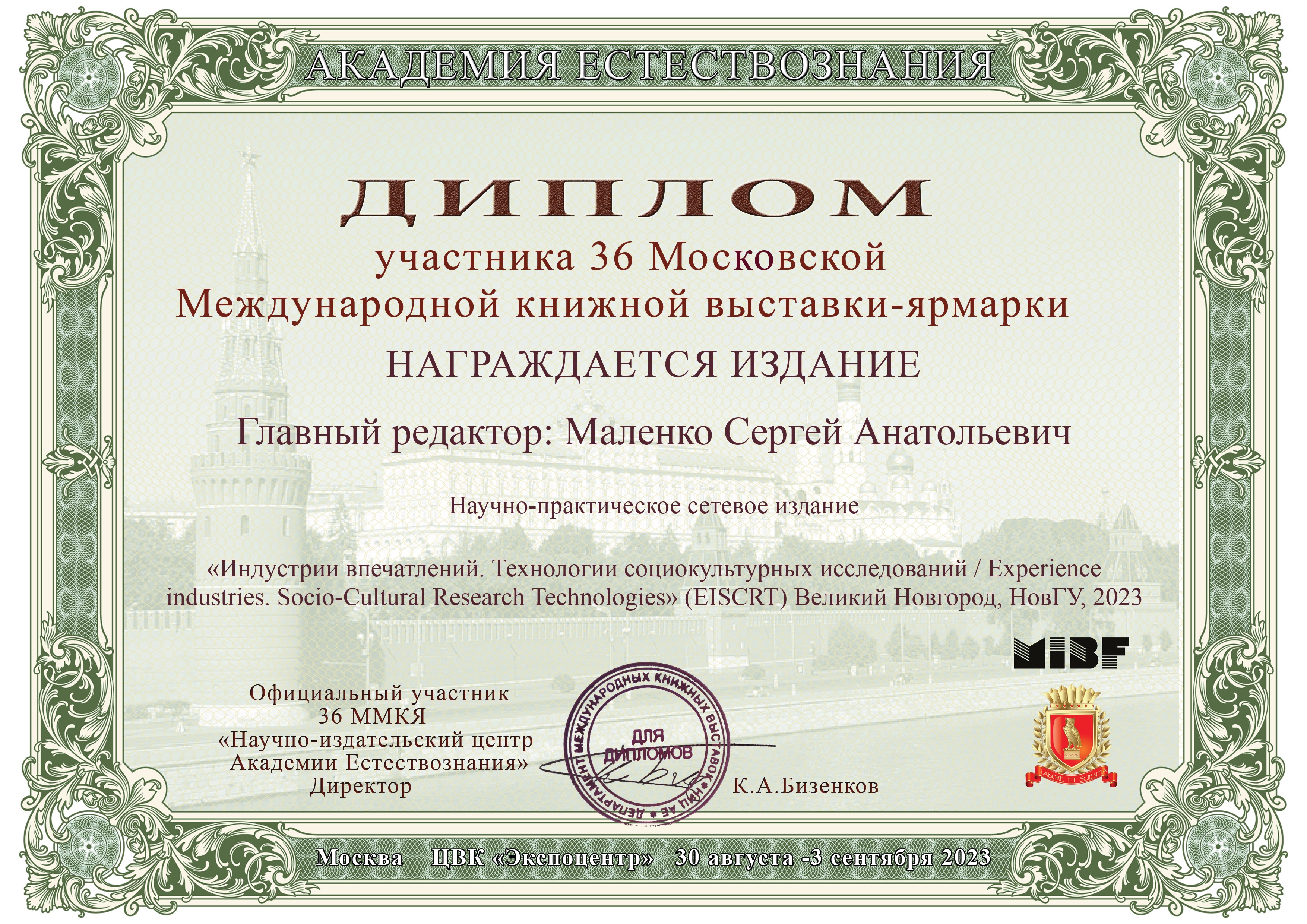ДОСУГ В ПРОСТРАНСТВЕ ИНДУСТРИИ ВПЕЧАТЛЕНИЙ: ОТ ЭЛИТАРНОСТИ К МАССОВОСТИ
DOI:
https://doi.org/10.34680/EISCRT-2024-1(6)-9-17Аннотация
Дорогие читатели!
Редакция научно-практического сетевого издания «Индустрии впечатлений. Технологии социокультурных исследований / Experience industries. Socio-Cultural Research Technologies» (EISCRT) представляет Вашему вниманию первый выпуск в наступившем 2024 году. В номере опубликованы исследования отечественных авторов, которые с междисциплинарных позиций рассматривают спектр современных социокультурных практик и пытаются нащупать актуальные антропологические, консюмеристские и социально-политические тренды индустрии впечатлений, повсеместно обнаруживающиеся в медиапространстве.
Номер открывает статья белгородской исследовательницы Софьи Бацановой, посвященная изучению индустрий красоты. Автор обоснованно утверждает, что именно забота женщины о своём внешнем виде является на сегодняшний день одной из главных ее социальных задач. В то же время нарастающий и буквально неусыпный контроль женщин над их собственными телами становится ведущей причиной формирования отчуждения, которое со временем лишь усугубляется, приобретая всё более милитаризированные свойства и демонстративные армейские черты.
Проблема отчуждения находит очень интересную интерпретацию и в исследовании кандидата культурологии из Москвы Дарьи Журковой. Она рассматривает феномен ресайклинга песен советской эстрады на примере популярной сегодня видеоигры «Atomic Heart». Автор подчеркивает, что использование популярных советских саундтреков позволяет создать у аудитории игроков чувство многомерности социальной реальности, придать ей намеренно парадоксальный характер, а также в специфической форме актуализировать для поколения «зуммеров» социокультурное наследие советской эпохи.
Показательно, что современная медиакультура позволяет не только сохранять и приумножать культурную память, но и обладает значительным потенциалом для программирования чувств и мыслей массового зрителя. Наиболее продуктивными в этом смысле выступают актуальные, намеренно идеологизированные способы визуализации социально-политических паттернов, которые в своей статье исследуют авторы Андрей Некита и Сергей Маленко. Этим материалом они завершают большой цикл исследований, посвященных анализу темы войны в традиции американских фильмов ужасов. По убеждению ученых, как раз в этом жанре кинематографа война представлена во всем спектре ее социальных презентаций: от повседневных супружеских «войн» до изощренных сценариев милитаризации взаимодействия человека с любым из возможных элементов окружающего или же и вовсе внеземного мира. Именно фильм ужасов, по мнению авторов, превратился в наиболее эффективный идеологический инструмент, повсеместно транслирующий сценарии безраздельного доминирования американского образа жизни над каким бы то ни было иными культурными традициями.
Помимо ставших уже привычными в нашем издании рубрик, в этом номере мы открываем и новое направление исследований, в рамках которого будут представлены тексты, посвященные анализу философии и социологии ощущений, рассматриваемых в контексте разнообразного социокультурного опыта цивилизации. Эту рубрику мы назвали «Дело вкуса: впечатления коносьера» и рады представить читателю первый опыт погружения во «вкусовую реальность» элитарной и многовековой культуры вина. С этим благородным почином выступили Олег Шевченко и Анна Дорофеева, представляющие Крымский федеральный университет. Авторы обещают сделать эти выпуски постоянными, а в рамках своего первого материала они проводят междисциплинарный анализ мифопоэтики вина, умело переплетая исторические факты, терруар, поэзию и миф.
Рубрику «Горизонты» открывает статья молодой исследовательницы из Казани Александры Анисимовой, посвященная изучению новых технологий продвижения культурных продуктов в современных сетевых сервисах. В данном случае, в поле зрения автора попал абсолютно свежий российский сериал «Король и Шут», который в свое время активно продвигался сервисом «Кинопоиск». Нельзя не согласиться с утверждением автора, что на примере анализа подобных сетевых технологий в рамках индустрии впечатлений обнаруживается неуклонная тенденция к слиянию традиционной журналистики и PR-технологий.
Рефлексируя над актуальными социокультурными трендами, молодые независимые исследователи из Великого Новгорода Вадим Петров и Дарья Якимчук намеренно сужают предметную область индустрии впечатлений и останавливаются на рассмотрении секс-туризма как достаточно неординарного, но массового явления современной туриндустрии. На примере обширного эмпирического материала авторами описываются сценарии реализации сервисных индустрий в сфере экстремальных боди-практик и делается вывод о том, что этот вид мирового туризма имеет многовековую историю и сакральные корни. Во многом поэтому в целом ряде стран он превратился в самостоятельный, легализованный и достаточно прибыльный сегмент индустрии впечатлений.
Завершает выпуск материал Всеволода Шипулина, посвященный изучению сценариев самопрезентации молодежи на современных цифровых платформах. Он обоснованно и аргументированно утверждает, что именно медиасреда за счет своих специфических особенностей оказывается наиболее соразмерной актуальным молодежным сценариям поиска и обретения собственной идентичности. Как раз в современном цифровом пространстве впервые создается возможность формирования как позитивных, так и деструктивных молодежных субкультур, которые ранее, в рамках традиционной системы социальной коммуникации, практически не находили адекватных способов самовыражения.
Творческий коллектив сетевого издания выражает надежду на то, что представленные в очередном выпуске исследования окажутся интересными и полезными для широкой читательской аудитории, пробудят интерес к изучению яркой и многообразной палитры современных индустрий впечатлений.
Для цитирования статьи:
Маленко, С. А. (2024). Досуг в пространстве индустрии впечатлений: от элитарного к массовому. Индустрии впечатлений. Технологии социокультурных исследований (EISCRT), 1 (6), 9–17. https://doi.org/10.34680/EISCRT-2024-1(6)-9-17








